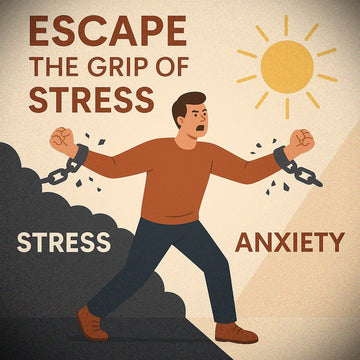From school exams to office deadlines, from household responsibilities to financial pressures—life today often feels like a nonstop race. Stress and anxiety have become part of almost everyone’s daily routine. In fact, the World Health Organization (WHO) reports that over 301 million people worldwide struggle with anxiety disorders, making stress one of the leading causes of poor health in modern times.
While a small amount of stress can sometimes boost focus and performance, prolonged stress often transforms into anxiety, taking a toll on both mind and body. The encouraging part is that managing stress and anxiety is possible. With a few lifestyle changes, simple daily habits, and a positive mindset, you can build resilience and restore balance.
In this blog, we’ll walk you through practical, step-by-step ways to keep stress and anxiety under control.
Understanding Stress and Anxiety
Before exploring solutions, it’s important to understand the difference between the two. Stress is your body’s natural response to external pressures such as deadlines, conflicts, or exams. Anxiety, on the other hand, develops when that stress lingers and turns into ongoing worry, fear, or unease.
Managing anxiety starts with awareness. The first step is identifying your triggers those specific situations, thoughts, or habits that make you feel tense, restless, or irritable. Once you recognize them, you can begin taking control instead of letting them control you.
Stress and Anxiety Management in Daily Life
When it comes to handling stress and anxiety, there isn’t a one-size-fits-all solution. The key lies in building a mix of healthy habits. Simple activities—like practicing deep breathing, taking a short walk, or sharing your thoughts with a friend can provide instant relief.
When practiced consistently, these small steps train your mind to stay calm, much like how regular workouts strengthen your muscles at the gym. Over time, these daily habits create resilience, helping you manage challenges without feeling overwhelmed.
Anxiety Management Techniques That Actually Work
One of the most common questions people struggling with stress and anxiety ask is: “How can I manage it?” The truth is, there isn’t just one answer. Instead, there are several easy and effective techniques that can bring quick relief and help you feel grounded.
-
Breathing Exercise: Inhale slowly for 4 seconds, hold your breath for 4 seconds, and then exhale for 4 seconds. Repeat this cycle a few times to calm your nervous system.
-
Grounding Technique: Bring yourself back to the present by naming 5 things you see, 4 things you feel, 3 things you hear, 2 things you smell, and 1 thing you taste.
-
Journaling: Write down your thoughts and emotions. Putting your worries on paper helps clear your head and reduces mental clutter.
These simple practices shift your focus to the present moment, breaking the cycle of overthinking and constant worry.
Managing Anxiety Without Medication
Medication isn’t always the first step when it comes to overcoming anxiety. In fact, many people successfully manage their symptoms through natural lifestyle changes. Simple habits such as regular exercise, quality sleep, staying hydrated, and limiting caffeine can make a big difference in keeping anxiety under control. Even dedicating just 20 minutes a day to meditation or yoga can help you build calmness and resilience.
If you’re wondering how to manage anxiety without medication, the key is to start small. Pick one activity like practicing deep breathing or going for a short walk and make it part of your daily routine. Over time, these small steps can clear your mind and strengthen your ability to cope.
Management of Anxiety in Natural Ways
Nature has gifted us with simple yet powerful tools for healing. If you’re wondering how to manage anxiety naturally, there are many effective approaches that rely on everyday choices.
Natural methods often focus on food, lifestyle, and environment. Eating a balanced diet rich in fruits, vegetables, nuts, and whole grains nourishes the brain. Herbal teas like chamomile or green tea are known for their calming effects. Spending time in sunlight boosts Vitamin D levels, which is closely linked to better mood and reduced anxiety.
In short, managing stress and anxiety doesn’t always require complicated solutions. These natural remedies are gentle, effective, and easy to integrate into daily life. Sometimes, the best therapy is as simple as stepping outside and breathing in the fresh air beneath the open sky.
How to Control Anxiety Attacks
Anxiety or panic attacks can feel overwhelming—your heart races, breathing becomes heavy, and it may seem like something is seriously wrong. The important thing to remember is that these episodes, while frightening, are temporary and will pass. Learning how to cope in the moment can greatly reduce fear and help you regain control.
Tips to manage anxiety attacks:
-
Remind yourself: “This is just anxiety. It will pass.”
-
Focus on slow, steady breathing to calm your body.
-
Use grounding techniques to bring yourself back to the present.
-
Call or talk to a trusted friend if you need support.
Grounding Exercise: The 5-4-3-2-1 Method
-
5 things you can see
-
4 things you can touch
-
3 things you can hear
-
2 things you can smell
-
1 thing you can taste
This simple technique redirects your mind from anxious thoughts to your immediate surroundings, helping you feel more centered. With regular practice, you’ll notice that anxiety attacks become less intense and occur less frequently.
Management of Anxiety Disorder
When anxiety becomes intense and continues for months, it may develop into an anxiety disorder. Such conditions are best managed with the support and guidance of physicians or mental health professionals. Alongside professional treatment, lifestyle adjustments and the self-care practices mentioned above can play an important role in recovery.
Remember, seeking help is not a sign of weakness—it’s a strong and positive step toward healing. If you’ve been struggling with anxiety for a long time and natural remedies haven’t brought relief, consulting a specialist is the wisest choice. Professional care can provide clarity, treatment options, and a pathway toward lasting recovery.
Final Thoughts on Managing Anxiety
You’ve now explored a variety of ways to manage stress and anxiety—from everyday habits and natural remedies to coping strategies for panic attacks. The goal isn’t to completely eliminate anxiety, but to learn how to live with it in a healthier, more balanced way.
If your anxiety ever feels overwhelming, don’t hesitate to seek support from a doctor or counselor. For many people, though, simple practices like mindful breathing, nourishing meals, regular exercise, and a positive mindset can make a remarkable difference.
Stress and anxiety may show up in life often, but with the right tools, you can choose calm over chaos and peace over panic.
Frequently Asked Questions About Stress and Anxiety
Can stress and anxiety cause weight loss?
Yes. Stress and anxiety can lead to weight loss by suppressing appetite and speeding up metabolism in some individuals.
Can stress and anxiety cause chest pain?
Yes. They may cause chest pain as a result of muscle tension and an elevated heart rate, sometimes resembling heart-related conditions.
Can stress and anxiety cause acid reflux?
Yes. Stress and anxiety can trigger or worsen acid reflux by increasing stomach acid production and disrupting normal digestion.
Can stress and anxiety cause a heart attack?
Not directly. However, prolonged stress and anxiety can raise the risk of heart problems by elevating blood pressure and putting strain on the heart.
Can stress and anxiety cause high blood pressure?
Yes. During periods of stress or anxiety, the body releases hormones that temporarily spike blood pressure levels.





